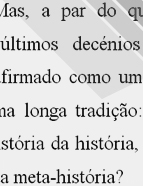

................................
Since the 1990s, doctoral theses have been developed covering highly variable territories and chronologies: the study of the dissemination system of historiography, of the reception, and appropriation of historical thought in the 19th century, as well as a contribution to the prosopography of its disseminators; a reinvention of the image and political and historical thought of the most influential historians and political thinkers of that era by their contemporaries and by posterity—Herculano and Oliveira Martins—the memory constructed by liberalism historians in Portugal—or institutions that sponsored historical studies— such as the Royal Academy of History.
More recently, comparative studies have been undertaken within well-defined scopes. Considering parameters such as nation, race, class, religion, and gender, works of comparative history between the history of history in Portugal and Brazil (1945-2000) and between Portuguese and Spanish historiography have been produced, examining the thoughts of two historians, one Portuguese (Oliveira Martins), the other Spanish (Rafael Altamira), based on concepts of the history of civilisation. Initial steps have been taken to gain further insights into the intellectual and experiential relationships between Portuguese historians and their counterparts from other nations, in particular Brazilians, Spaniards, the French, and English— such as Edgar Prestage and Charles Boxer. However, the study of these transnational cultural relationships needs to be expanded. Cases such as those of 19th-century figures Ferdinand Denis and Heinrich Schaefer are of great significance, as their general histories of Portugal enjoyed widespread readership in the country. The study of exiles is essential—consider the early proponents of liberalism in Portugal, who, at the end of the Ancien Regime, sought refuge in London (e.g., José Liberato and Rocha Loureiro), or the well-known case of the Viscount of Santarém, who, following the victory of the liberal regime in 1834, relocated to Paris, where he conducted important work on the history of the Discoveries and cartography. Another notable figure is Jaime Cortesão, admired by Fernand Braudel (“Au Portugal: avant et après les grandes découvertes,” Annales E.S.C., vol. IV, 1949, pp. 193–196), who was exiled in Brazil for many years (1940–58). Studies already exist on the period before this historian of the Discoveries entered his second exile, as well as on Fidelino de Figueiredo (up to 1927). However, further work is needed to extend these studies to the period after these intellectuals left Portugal, particularly following the establishment of the Military Dictatorship or, in Cortesão's case, during World War II.
